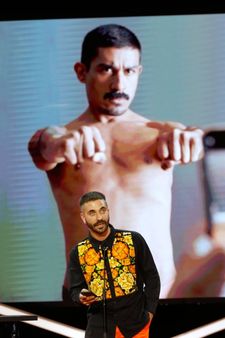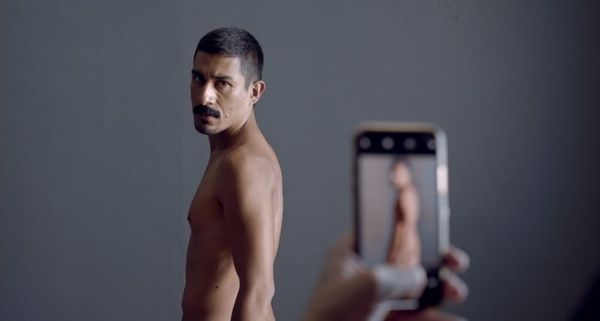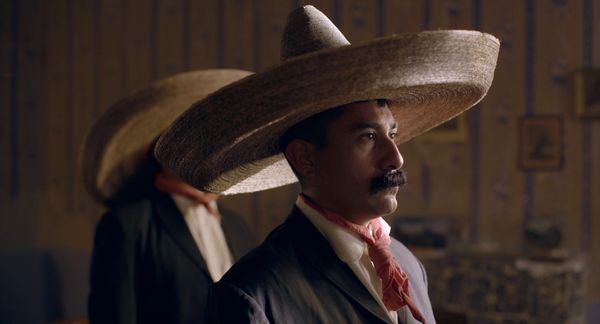After the film screened at San Sebastian Film Festival - where it won later the jury prize for cinematography - I caught up with Abramovich to talk about the line between fact and fiction in the film, shooting a film within a film and the controversy it attracted after Lalo didn’t attend the film festival, saying the film affected his mental health.
Can you tell me what led you to want to combine documentary and fiction in this hybrid way?
MA: in my work, I always reflect on this movement from being a person to being a character. So I, because I believe we will live like playing characters in order to be able to be with others or function in the system, in the family or institutions. And so in my films, I always like to invite normal people to play the characters that they play in their own lives.
In the case of this subject, how easy was it to get people on board? I feel as though this world of porn is a closed one to some degree and that people might not be so open to letting in an outsider.
MA: The starting point for me was masculinity as a character. To think about this character of being a man or someone strong who has to hide the feelings and emotions basically. This is also a personal question that I have been asking myself in the last years, like, do I still want to be a man in that sense? Do I still want to be that character and hide my feelings and pretend to be strong because of someone else's expectations? So I came to this world and to the protagonist asking questions about my own masculinity in crisis.
 |
| Director Manuel Abramovich receiving the San Sebastian jury prize for cinematography Photo: Courtesy of San Sebastian Film Festival/Pablo Gómez |
The Zapata porn film is a genuine movie. How did its director feel about being even more of a straightforward documentary subject than your main protagonist is in a way?
MA: With the main protagonist it was like an invitation to reflect together on all these political ideas that we were discussing - like sex work, masculinity, loneliness, depression, HIV, social media - to transform them together into film. It was a process of four years of collaboration where we found ways together to transform these issues into the final film. With the shooting it was interesting because, indeed, there was a real porn film happening. So we had, like, two shoots. Pornomelancholia was not interested in focusing on the sex. Even though you have the impression that you see a lot of sex, there’s actually no sex [on the porn shoot]. I wanted to leave the sex out of the frame, you know, and to use the pornography as a context to access these people’s lives and emotions and loneliness and vulnerability.
The director has been working for 20 years, he did a lot of feature porn films, always reflecting on Mexican identity and the Mexican icons or history. And he's also an actor, a chef, director, and musician. So he's an amazing person. And he did this script about the Mexican Revolution. So this shooting was happening, actually, the film will be released at some point, so people will be able to see the Zapata film online. But that film has another Zapata because our protagonist, Lalo, didn't want to do sex scenes. So we found the double for him to be in the porn film.
Everyone, including myself, was all very confused about what's real and what is fiction during the two shootings. It was a very interesting experience and it was a very open atmosphere, with a lot of trust. Everyone was really ‘heard’, I think with these kinds of films, you can only do them with trust.
The idea that social media can almost drive you to do things that you ordinarily wouldn't do, can almost manipulate your character in some way is a very interesting one. One that I think that really comes to the fore in this film.
Yeah, absolutely. For me, it's, it's not a film about pornography, it's about how intimacy or how intimacy can turn into porn in a way. So it's not just that it's porn but it's also the way we all share our lives on social media. I think almost everyone is exposing themselves to a point because we want to be loved or accepted or validated. So we expose our lives as porn.
It’s like the monetisation of every aspect
MA: I think it's new contemporary jobs in capitalism, you know, before we would work for a factory as a worker, and now we are self-directing our porn We can earn money out of it but we are still slaves of the system.
There’s also an idea about how people’s attention spans for content are getting shorter, so Lalo is cutting his sex videos into smaller snippets - which is interesting given that you are a long-form filmmaker
MA: I think it's interesting because, for example, I like to think our phones became kind of the most intimate element of our lives. If I can check your phone, I will get access to the most intimate parts of yourself. Everything goes so fast and the way we stage our persona or our virtual lives, the way we write messages and then we delete them and rewrite to get to observe this, these constructions and this mise en scene is so interesting to me in a world that it's like going super fast.
I have to ask you about the controversy with the film because that must impact you especially as you view the film as a collaboration.
MA: I feel a big responsibility working with people. And I feel like the privilege of using cinema as a platform to build, together with the protagonists, a project that’s questioning the world that we live in now that is kind of falling apart in a way. I know that it's a big risk, and staging elements of one's own life, for a film, in such a sensitive delicate project, is like a process. It might bring a lot of questions and fears to be exposed at a big leve. So now I'm basically sad because he's not here to express his feelings because I would like to understand his change of perception. And because the whole team, more than 30 people, for four years all wanted to give him a space to support him and for him to feel like a safe space. It's very personal and we are all here together.
The film is also quite educational, for example, the conversation the porn cast have about HIV and AIDS will probably be an eye-opener for a lot of people.
MA: I’m glad you saw that because it was very important for me to to be able to talk for example, about HIV or even sex openly, without judging. It’s something that is still full of taboos and prejudice and I wanted the film to empower the characters who live with HIV. I think it’s super-important to talk naturally and even to laugh about it. We still have so much to learn, people don't really know about these issues. That’s why the film takes like this gay porn context but it’s not about porn. It's about loneliness. And for me, it's a reflection of this era, these times that we all feel kind of broken.
Do you think people are trying to understand things in a different way post-Covid
MA: I feel like after Covid, we are like living this kind of nonsense, feeling an emptiness. We don't really know where we are going as humanity. And that's why, for example, I think it's really important that the film is here in the main competition Not because of the competition, but lthat the film can be seen by anyone - to raise these these kinds of questions for a bigger audience, not only a niche for like cinephiles, or gay or queer audiences.























